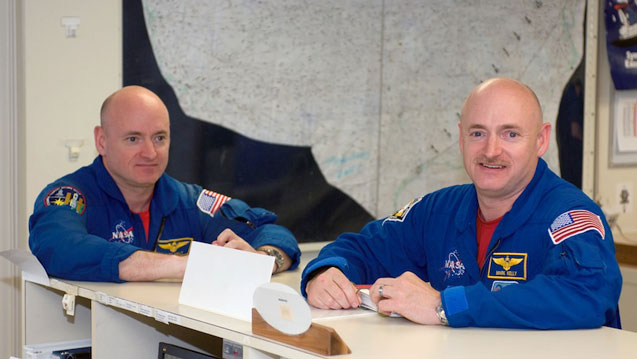EVANSTON, Ill. --- NASA has selected a Northwestern University-led research team as one of 10 groups across the country to conduct investigations related to its unique “twins study” of how a year living in space affects the human body, the agency announced Friday (March 7).
The team includes colleagues at Rush University Medical Center and the University of Illinois at Chicago. The project is titled “Metagenomic Sequencing of the Bacteriome in GI Tract of Twin Astronauts.”
Identical twin veteran astronauts Scott and Mark Kelly will be participating in the study of the effects of long-term space missions, such as a mission to Mars. They are the only set of twins that has ever been into space.
Beginning March 2015, Scott Kelly will spend a year at the International Space Station -- the longest space mission ever assigned to a NASA astronaut -- while his brother remains on Earth, at home in Arizona with his wife, former U.S. Rep. Gabrielle Giffords.
“We are like little kids again -- everyone wants to be a part of this fascinating study in space,” said Northwestern circadian rhythm expert Fred W. Turek, who will lead the team studying how the space environment affects the microbiota in the intestinal tract.
The NASA Human Exploration Research Opportunities (HERO) project at Northwestern is centered on sequencing of the microbiome of the twin astronauts. It is also complementary to nine other biomolecular research projects that seek to integrate -omics-based studies on the effects of spaceflight and will involve data-sharing and data analyses with other twins study team members. (Omics is a rapidly growing field of study in biology ending in -omics, such as genomics, proteomics or metabolomics.)
“Comparing a wide range of biomarkers linked with the health of a wide range of mental and physiological processes in genetically identical twins before, during and after space flight will allow us to better understand how the long-term exposure to the space environment impacts the human brain and body,” Turek said. “This is information that will be vital for missions to Mars and beyond that will involve astronauts living in space for three or more years.”
Turek is the Charles E. and Emma H. Morrison Professor of Biology in the Weinberg College of Arts and Sciences and director of Northwestern’s Center for Sleep and Circadian Biology.
The complex ecological microbiology community that inhabits the human gastrointestinal tract (GI) tract influences normal physiology and behavior and susceptibility to disease. Despite the clear importance of the GI microbiota for maintaining overall health and influencing disease state, the effects of the spaceflight environment on the human microbiome remains unknown.
“Thus, it is imperative that studies be carried out on long-term missions in space so that any adverse changes can be identified and countermeasures can be employed to insure the safety and health of our astronauts on extended spaceflight missions,” Turek said.
NASA’s Human Research Program will fund 10 short-term, first-of-its-kind investigations into the molecular, physiological and psychological effects of spaceflight in a continuous effort to reduce the health impacts of human space exploration.
The 10 selected proposals, which are from 10 institutions in seven states, will receive a combined $1.5 million during a three-year period.
Turek is the leader of the Northwestern project and is joined by co-investigator Martha Hotz Vitaterna, research associate professor and executive director of the Center for Sleep and Circadian Biology, and Peng Jiang, postdoctoral associate at the Center for Sleep and Circadian Biology.
Three consultants -- Ali Keshavarzian, M.D., and Christopher Forsyth of Rush University Medical School, and Stefan Green of the University of Illinois Chicago -- will assist in the analysis and interpretation of the study results.
For more information on the experiments, visit NASA’s story, "NASA Selects 10 Proposals to Explore Genetic Aspects of Spaceflight."


